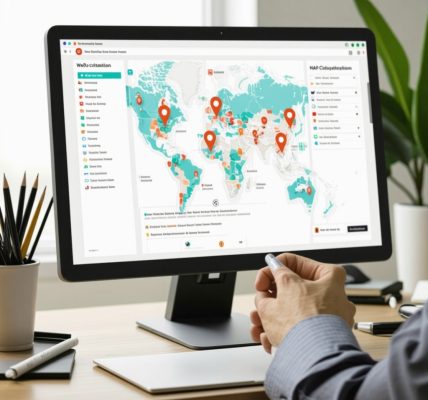Unlocking the Power of GMB Citation Management in Local SEO
In the fiercely competitive arena of local search, mastering Google My Business (GMB) citation management is a game-changer. Citations — mentions of your business name, address, and phone number (NAP) across the web — are foundational pillars that anchor your local SEO authority. But how do you strategically manage these citations to propel your business to the top of Google’s local 3-pack? This expert guide unpacks a step-by-step approach, blending practical wisdom and nuanced insights to elevate your local presence.
Crafting Consistency: The Linchpin of Citation Success
Imagine your local business as a story told across multiple platforms. If the core details vary even slightly, search engines and customers alike grow confused, undermining trust. Ensuring absolute consistency in your NAP across every citation source is paramount. Begin by auditing existing citations on authoritative directories, social platforms, and niche local listings. Tools like Moz Local or BrightLocal can expedite this process by identifying discrepancies and duplicates.
How Can You Identify and Fix Citation Inconsistencies Efficiently?
Addressing citation inconsistencies starts with a comprehensive audit. Use specialized SEO tools to crawl for inaccurate or outdated listings. Once identified, claim your listings and update your information meticulously. Prioritize high-authority sites such as Yelp, Bing Places, and industry-specific directories. Regular maintenance is critical; even a minor change in address or phone number necessitates immediate updates to avoid SEO penalties and customer confusion.
Building a Citation Network: Beyond Quantity to Quality
While quantity matters, the quality of citations carries more weight in Google’s local ranking algorithm. Focus on acquiring citations from reputable, locally relevant sources. Incorporate hyperlocal directories, chamber of commerce listings, and trusted industry associations. This approach not only boosts your SEO but also enhances your business’s credibility and visibility within your community.
Leveraging Structured Data Markup for Citation Precision
Integrating structured data markup (Schema.org) on your website complements your citation strategy by signaling to search engines the exact details of your business. This semantic SEO technique enriches your online footprint, facilitating improved local search visibility and accuracy. Experts recommend embedding LocalBusiness schema with precise NAP details and geocoordinates, reinforcing citation consistency in a machine-readable format.
Real-World Application: A Local Bakery’s Citation Triumph
Consider a local bakery that experienced stagnant foot traffic despite a verified GMB profile. By conducting a citation audit, they uncovered multiple inconsistent listings — varying phone numbers and outdated addresses. After systematically correcting these inconsistencies and enriching their presence on hyperlocal directories, their Google Maps rankings surged, leading to a 40% increase in local inquiries within three months. This case exemplifies how meticulous citation management tangibly impacts local SEO outcomes.
Embedding Citation Management into Your Ongoing SEO Workflow
Citation management is not a one-time task but an ongoing commitment. Set up quarterly audits to catch newly emerging inconsistencies or unclaimed listings. Synchronize citation updates with other GMB optimization efforts like review management and regular profile content updates to maximize local SEO impact. For deeper insights and advanced tactics, explore the comprehensive strategies on how to use GMB citation management to strengthen local authority.
Expert Tip: Harnessing Authoritative Data Aggregators
Data aggregators like Infogroup and Neustar play a pivotal role in disseminating your business information to a myriad of directories and platforms. Engaging with these aggregators ensures your citations propagate accurately and swiftly across the web ecosystem, amplifying your local SEO footprint. This strategic move often goes unnoticed but is a hallmark of advanced citation management.
For further authoritative resources on local SEO and citation strategies, consider the insights from Moz’s Local SEO Guide, a definitive reference recognized by industry experts worldwide.
If you found these strategies insightful, share your experiences with citation management or ask your pressing questions in the comments below to join our expert community discussion.
Going Beyond Basics: The Nuances of Citation Management
After my initial dive into citation consistency and quality, I realized that managing citations is much more dynamic than a one-time fix. It’s about weaving citation upkeep into the fabric of your ongoing SEO efforts. For example, I began tying citation updates closely with my Google Business Profile content refreshes and review management schedules. This synchronization not only keeps my listings fresh but also signals to Google that my business is active and engaged, which can positively influence local rankings.
Moreover, I learned the value of monitoring citation performance. It’s one thing to have consistent details out there, but tracking how those citations impact your local search visibility is another layer of insight that can guide smarter decisions. Tools like BrightLocal’s citation tracker offer this kind of data, revealing which citations generate traffic or backlinks, which helps prioritize efforts effectively.
What Role Does Citation Diversity Play in Local SEO?
One question I often ponder is: how much does the diversity of citation sources matter? From my experience and supported by SEO authorities, having citations spread across varied platforms — from local chambers of commerce to niche industry directories — creates a robust citation ecosystem that Google can trust. This diversity not only cushions your SEO against fluctuations in any single directory but also enhances your business’s local relevance and authority.
Interestingly, Moz’s Local SEO Guide underscores that citation diversity combined with quality is a critical factor in Google’s local ranking algorithm. This confirms my practical findings and emphasizes that a balanced citation portfolio is more effective than sheer volume alone.
Integrating Customer Reviews with Citation Strategy
Incorporating customer reviews into your citation management strategy is something I found invaluable. Reviews add a layer of authenticity and engagement that purely textual citations cannot offer. When customers leave consistent, positive feedback across multiple citation sources, it amplifies your business’s trust signals. This approach aligns perfectly with strategies outlined in boosting your small business SEO with Google Business optimization.
In practice, I encourage business owners to actively solicit reviews on their most impactful citation sites and respond thoughtfully to them. This not only fosters customer loyalty but enhances your local SEO in a very tangible way.
Practical Tip: Automating Citation Updates Without Losing Control
At one point, managing citations manually became cumbersome, especially for businesses with multiple locations. I experimented with automation tools that sync your NAP info across platforms. However, I quickly learned the importance of maintaining manual oversight to catch errors or outdated info that automation might miss.
So, my recommendation is to use automation as a time-saving aid, but schedule regular manual audits. This hybrid approach ensures accuracy while freeing up time to focus on other SEO initiatives.
Are You Ready to Elevate Your Local SEO with Citation Mastery?
Now, I’d love to hear from you. How do you currently manage your citations? Have you faced challenges with inconsistent listings or struggled to maintain citation diversity? Share your stories and tips in the comments below — your insights could be the very guidance another local business owner needs.
Also, if you want to dive deeper into optimizing your Google Business listings and local search presence, check out our detailed guides on how to optimize your Google Business listing effectively and mastering GMB ranking techniques. Your journey to local SEO success is just a few clicks away!
Mastering Citation Velocity: Timing Your Updates for Maximum SEO Impact
In the realm of citation management, velocity—the frequency and timing of citation updates—plays a critical yet often overlooked role. Rapid, consistent updates to your business information can signal to search engines that your local presence is active and authoritative. However, erratic or infrequent changes risk diluting your citation trustworthiness.
To optimize citation velocity, harmonize your NAP updates with significant business changes, such as relocations or phone number modifications, and align these with your Google Business Profile refresh cycles. Leveraging automation tools can aid in prompt dissemination, but it’s essential to monitor the updates manually to ensure precision and prevent erroneous data propagation.
Harnessing the Power of Citation Syndication Networks for Broad Reach
Citation syndication networks—platforms that aggregate and distribute business data en masse—are instrumental in amplifying your local SEO footprint. Collaborating with reputable data aggregators like Infogroup, Neustar Localeze, and Factual ensures that your corrected and optimized citations cascade efficiently across thousands of directories, maps, and apps.
However, the efficacy of syndication depends heavily on the quality and accuracy of your submitted data. Clean, consistent, and enriched business listings (including categories, hours, and attributes) maximize the syndication impact, preventing the spread of conflicting information that could harm your rankings.
How Do Citation Syndication Networks Affect Local SEO Rankings and Data Integrity?
Citation syndication networks serve as the backbone of local data distribution. When your business information flows through these networks accurately, search engines receive consistent signals affirming your business’s legitimacy and relevance. Conversely, inaccuracies at the source level multiply across downstream platforms, causing confusion and ranking penalties.
According to the BrightLocal Local SEO Citation Guide, businesses that actively manage their primary data sources within syndication networks experience significantly improved local search visibility and reduced instances of incorrect listings. This underscores the necessity of strategic engagement with these networks as part of an advanced citation management plan.
Advanced Schema Implementation: Beyond Basic LocalBusiness Markup
While embedding basic LocalBusiness schema is foundational, elevating your structured data strategy can further enhance citation precision and local SEO performance. Integrate detailed schema types such as Service, OpeningHoursSpecification, and GeoCoordinates to convey nuanced information directly to search engines.
Advanced schema deployment also involves using sameAs properties to link your official social profiles and key citation sources, reinforcing the authenticity of your business identity across the web. This semantic enrichment not only aids in disambiguating your brand but also supports Google’s Knowledge Graph integration, enhancing your local search prominence.
Utilizing Citation Metrics and Analytics for Strategic Refinement
Beyond establishing and maintaining citations, tracking their performance through metrics and analytics offers a competitive edge. Tools like BrightLocal and Whitespark provide insights into citation quantity, quality, and their influence on local rankings and referral traffic.
Analyzing these data points allows for prioritizing citation efforts toward platforms delivering the highest ROI, uncovering opportunities for new citations in untapped directories, and identifying citation sources that may require correction or removal due to negative impact.
Embedding citation performance analytics into your local SEO dashboard enables data-driven decisions, ensuring your citation strategy evolves alongside search engine algorithms and market dynamics.
Next Steps: Elevate Your Citation Strategy with Expert Tools and Tactics
If you’re ready to transcend basic citation management and harness the full spectrum of local SEO benefits, consider integrating advanced syndication partnerships, implementing rich schema markups, and leveraging analytic insights. These layers of sophistication not only improve your rankings but also build a resilient local digital presence.
Explore our in-depth guide on advanced GMB citation management techniques to unlock actionable tactics and tools curated for seasoned local SEO practitioners.
Have you experimented with citation velocity or syndication networks in your local SEO campaigns? Share your experiences and questions below to join a vibrant community of experts driving citation excellence.
Maximizing Local Authority Through Citation Syndication Networks
In the intricate web of local SEO, citation syndication networks act as pivotal conduits for distributing your business data across myriad platforms. These networks, operated by data aggregators such as Infogroup, Neustar Localeze, and Factual, ensure that your business information cascades efficiently and uniformly, amplifying your visibility in local search ecosystems.
However, the efficacy of leveraging these syndication networks hinges on the precision and richness of your submitted data. Comprehensive listings enriched with accurate categories, operating hours, and attributes not only prevent the propagation of conflicting information but also enhance your business’s perceived trustworthiness by search engines.
How Do Citation Syndication Networks Affect Local SEO Rankings and Data Integrity?
Citation syndication networks underpin the dissemination of your business information, effectively shaping the consistency and reliability of online data. When your listings within these networks are meticulously maintained, search engines receive corroborated signals affirming your business’s authenticity and relevance in the local marketplace. Conversely, inaccuracies originating at the source level proliferate downstream, potentially undermining your rankings due to data fragmentation and diminished trust.
As detailed in the BrightLocal Local SEO Citation Guide, businesses engaging proactively with primary data aggregators experience marked improvements in local search prominence and a substantial reduction in erroneous listings. This underscores the strategic imperative of integrating syndication network management within sophisticated citation workflows.
Elevating Citation Precision with Advanced Schema Markup Techniques
While foundational use of LocalBusiness schema markup establishes baseline clarity for search engines, deploying advanced structured data strategies can significantly augment your local SEO performance. Incorporating detailed schema types like Service, OpeningHoursSpecification, and GeoCoordinates communicates granular business attributes, facilitating enhanced search result features and richer knowledge panels.
Moreover, utilizing the sameAs property to link authoritative social profiles and high-quality citation sources reinforces your brand’s digital identity, aiding in disambiguation and bolstering trust in Google’s Knowledge Graph. This semantic enrichment is a hallmark of cutting-edge citation management, enabling a resilient and authoritative local presence.
Strategic Insights: Leveraging Citation Analytics for Continuous Optimization
Beyond establishing citations, harnessing analytics tools to monitor citations’ impact on local rankings and referral traffic offers a competitive advantage. Platforms like BrightLocal and Whitespark provide actionable metrics revealing citation quantity, quality, and performance correlations with SEO outcomes.
By integrating these insights into your local SEO dashboard, you can prioritize citation efforts toward the most effective directories, identify new citation opportunities, and swiftly address sources negatively impacting your visibility. This data-driven approach ensures your citation strategy evolves responsively with changing algorithms and market conditions.
Next-Level Citation Velocity: Synchronizing Updates for Maximum Effect
Understanding and managing citation velocity—the cadence of your citation updates—can be pivotal. Timely, consistent updates aligned with business changes and GMB profile refreshes signal vitality to search engines, whereas sporadic or delayed alterations risk eroding citation trust.
Employing a blend of automation tools and manual oversight enables prompt yet precise dissemination of updates, safeguarding data integrity across the digital landscape. This nuanced balance is essential for sustaining authoritative citations that continuously bolster local SEO strength.
Are You Ready to Transform Your Local SEO Through Advanced Citation Mastery?
Elevating your citation management with syndication network engagement, advanced schema implementation, and rigorous analytics integration unlocks a new tier of local SEO success. For a comprehensive dive into these sophisticated tactics, explore our in-depth advanced GMB citation management guide.
Share your experiences with citation syndication or schema deployment in the comments below. Join our expert community and exchange insights that drive citation excellence and sustainable local search dominance.
Frequently Asked Questions (FAQ)
What exactly is a citation in local SEO, and why is it important?
A citation in local SEO refers to any online mention of your business’s name, address, and phone number (NAP), typically found on directories, websites, and social platforms. Citations help search engines verify the legitimacy and location of your business, which directly influences your local search rankings and visibility in the Google 3-pack.
How do inconsistencies in citations affect my Google My Business ranking?
Inconsistent NAP information across citations causes confusion for search engines and users, reducing trust signals and potentially lowering your local rankings. Even minor discrepancies—such as different phone formats or outdated addresses—can fragment your online presence and dilute your SEO authority.
What tools are recommended for auditing and managing citations efficiently?
Specialized SEO tools like Moz Local, BrightLocal, and Whitespark are widely regarded for auditing citations, detecting duplicates, and monitoring data accuracy. These platforms streamline the identification of inconsistencies and support ongoing maintenance through automated alerts and reporting.
How does citation diversity impact local SEO effectiveness?
Citation diversity—having your business listed across a variety of authoritative and locally relevant platforms—strengthens your SEO by creating a robust, multi-source presence that signals broad local relevance to Google. Relying solely on a few directories limits this effect and may expose your data to volatility if those sources change.
What is citation velocity, and how should I manage it?
Citation velocity refers to the frequency and timing of updates to your citations. Maintaining consistent, timely updates aligned with business changes and Google Business Profile refreshes signals activity and authority to search engines. Erratic or infrequent updates risk undermining trust and ranking stability. Balancing automation with manual oversight is key.
Can structured data markup improve citation accuracy and local SEO?
Yes. Implementing advanced Schema.org markup such as LocalBusiness, Service, OpeningHoursSpecification, and GeoCoordinates on your website provides machine-readable, precise business details. This semantic enrichment helps search engines better understand and trust your information, complementing citation consistency and enhancing local search features.
What role do citation syndication networks play, and how do they affect SEO?
Citation syndication networks, operated by data aggregators like Infogroup and Neustar Localeze, distribute your business data to thousands of directories and platforms. Accurate and enriched submissions to these networks ensure consistent citation propagation, improving local SEO visibility and reducing errors that could harm rankings.
How can customer reviews be integrated into my citation strategy?
Incorporating customer reviews across your key citation sources adds authenticity and engagement, enhancing trust signals. Encouraging consistent, positive reviews and responding thoughtfully boosts local credibility and supports SEO, as reviews influence consumer behavior and search engine perception alike.
Is it advisable to automate citation management completely?
While automation tools can save time by syncing NAP data across platforms, complete reliance on automation is risky. Manual audits remain essential to catch errors, outdated info, or discrepancies automation might miss. A hybrid approach balances efficiency with accuracy, maintaining control over citation integrity.
How do I measure the impact of my citation efforts on local SEO?
Utilizing analytics tools like BrightLocal and Whitespark enables tracking citation quantity, quality, and their correlation with local rankings and referral traffic. These insights facilitate prioritization of effective citation sources, identification of new opportunities, and timely correction of problematic listings, driving continuous optimization.
Trusted External Sources
- Moz Local SEO Guide (moz.com): An authoritative resource providing comprehensive strategies on local SEO, citation importance, and optimization techniques trusted by SEO professionals worldwide.
- BrightLocal Local SEO Citation Guide (brightlocal.com): Offers detailed explanations on citation management, syndication networks, and analytics, backed by industry data and practitioner insights.
- Google’s Structured Data Guidelines (developers.google.com): Official documentation on implementing Schema.org markup to enhance search result appearance and accuracy.
- Whitespark Local Citation Finder (whitespark.ca): A specialized tool for discovering local citation opportunities and monitoring citation health, valuable for data-driven citation strategies.
- Infogroup Data Aggregator (infogroup.com): A major data aggregator responsible for distributing business information widely, essential for understanding citation syndication dynamics.
Conclusion
Mastering Google My Business citation management is integral to achieving and sustaining high local SEO performance. This article has elucidated the critical role of citation consistency, quality, and diversity in building authoritative local presence. By leveraging advanced techniques such as structured data markup, strategic engagement with citation syndication networks, and analytics-driven optimization, businesses can amplify their visibility and trustworthiness in local search results.
Integrating citation velocity management and blending automation with manual oversight further ensures agility and precision in maintaining your digital footprint. Incorporating customer reviews into your citation strategy adds an authentic layer that resonates with both users and search engines.
Embrace these expert insights to evolve your citation approach beyond basic listings, fostering a resilient and dynamic local SEO foundation. Share your citation management experiences, ask questions, or explore our related expert guides to continue refining your local digital authority. Your journey to dominating local search starts with citation mastery—take the next step today!




